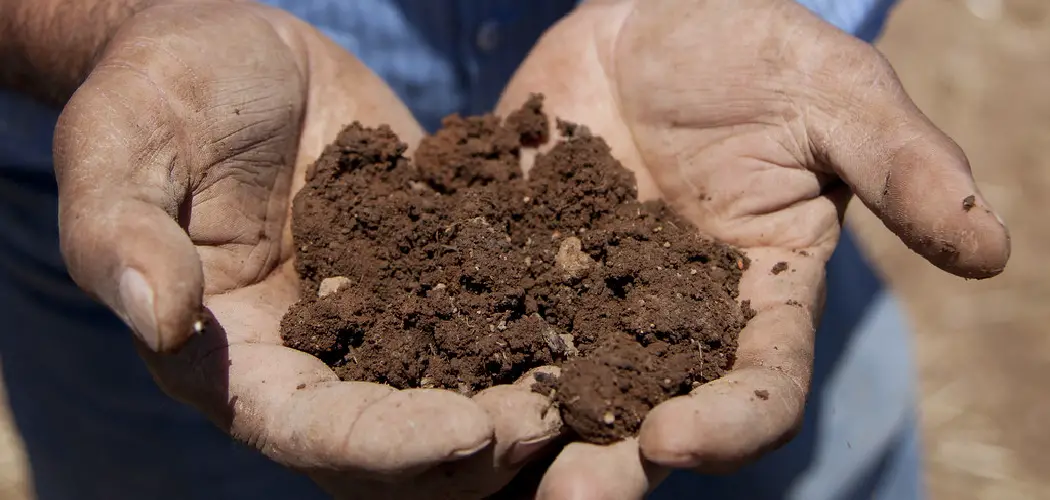Every gardener knows that cultivating healthy plants requires the right soil. However, not all soil is created equal, and some regions have a landscape that is naturally lacking in nutrients.
Fortunately, you can make nutrient-rich soil from scratch, providing your plants with the ideal growing substrate. In this blog post, we’ll discuss how to make soil from scratch and provide you with tips on improving soil quality for a bountiful garden.
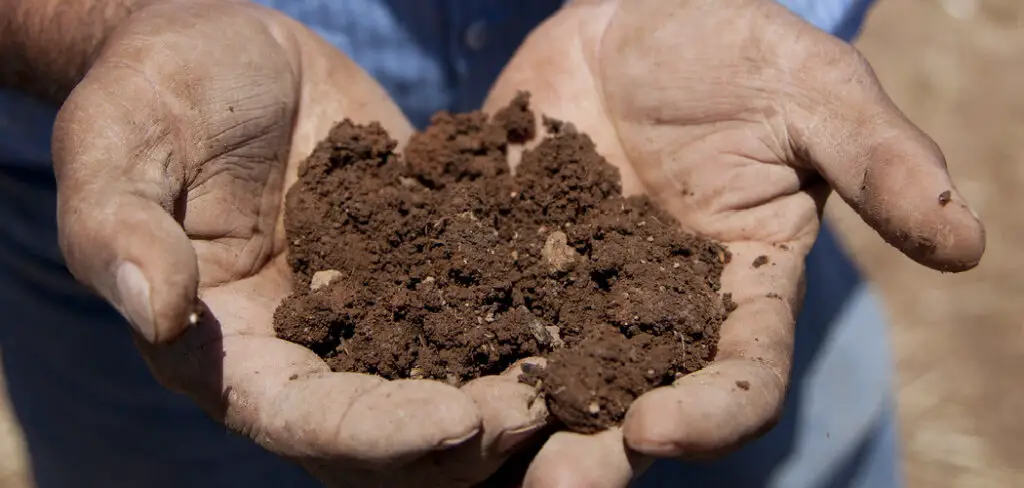
Can You Make Soil from Scratch?
Soil is an essential part of our ecosystem. Unsurprisingly, many have pondered whether it would be possible to create it from scratch.
While this may seem daunting, some have taken on the challenge and made significant strides toward achieving this goal.
Various organic materials, including compost, dead leaves, and shredded wood, can be used. These materials must be mixed together in specific proportions to ensure that the soil balances nutrients and structure. Once the perfect ratio has been achieved, this mixture is added to a container and left to decompose over time, transforming into nutrient-rich soil. While it may not be the easiest task, it’s possible to create soil from scratch with some knowledge and patience.
Why Should You Make Soil from Scratch?
Making your soil from scratch can be a game-changer for your garden in more ways than one. It gives you complete control over the specific nutrients and pH levels your plants need to thrive. You’ll also avoid some problems with store-bought soil, which can sometimes contain harmful chemicals or pathogens.
But beyond these practical benefits, creating your growing medium can be an immensely satisfying project. You’ll get to experiment with different ingredients and methods and see firsthand the results of your hard work.
Ultimately, making soil from scratch can deepen your understanding and appreciation of the natural processes that make our world so rich and diverse. So why not give it a try?
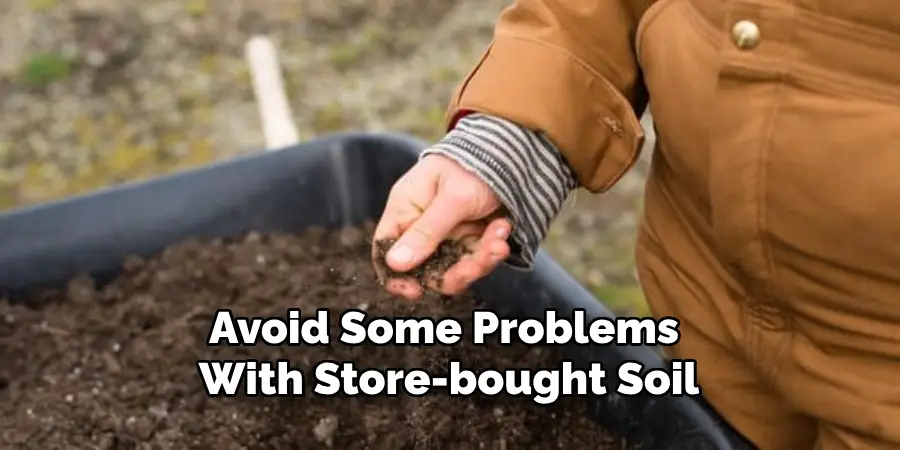
7 Tips to Follow on How to Make Soil from Scratch
1. Understand Your Soil Type
To make soil from scratch, start by understanding the soil type in your garden. You’ll want to pay attention to indicators like texture and drainage. Sandy soil, for example, will have a light, almost gritty texture that will not hold moisture well.
On the other hand, clay soil can be dense, sticky, and often slow to drain. Knowing what type of soil you have will inform the adjustments you need to make to improve soil fertility and water capacity.
2. Composting
Composting is a natural way to make nutrient-rich soil and is a great place to start. Composting involves collecting organic materials, from food waste to grass clippings, and letting that waste decompose into fertile compost.
Once the organic material has broken down sufficiently and the compost looks like soil, you can mix it into your garden soil, enhancing its fertility. Composting is an ongoing process, but it’s one of the most effective ways to add organic matter to your soil, which is necessary to increase soil fertility.
3. Add Nutrients
You can supplement your garden’s soil with minerals and nutrients like nitrogen, phosphorus, and potassium to ensure that it is healthy and nutrient-rich. Soil pH is also essential if you’re trying to grow specific plants.
You can test your soil pH with a kit designed for this purpose. Once you know your garden’s soil pH, you can adjust appropriately. Adding organic fertilizers like bone meal, blood meal, or compost tea can also give soil vital nutrients.
4. Mix in Peat Moss or Coco Coir
Organic materials like sphagnum peat moss and coco coir are another way to improve soil quality. Both of these organic materials can improve water retention and aeration. They’re also essential for breaking up dense soil like clay.
Peat moss and coco coir can provide soil with the right texture, so it’s perfect for planting and encourages good root growth. These organic materials can be found at most garden supply stores and are easily incorporated into your garden beds.
5. Mulching
Rather than removing fallen leaves, grass clippings, or garden waste, layer it on top of the soil as a mulch. Mulching prevents evaporation, suppresses weeds, and helps to maintain the overall soil temperature.
Over time, the organic matter of the mulch will decompose, and it will add to the nutrition of the soil. Adding mulch, in general, allows the soil to breathe and for microorganisms to get established and make the soil rich. You can also purchase organic mulch from your local garden supply store.
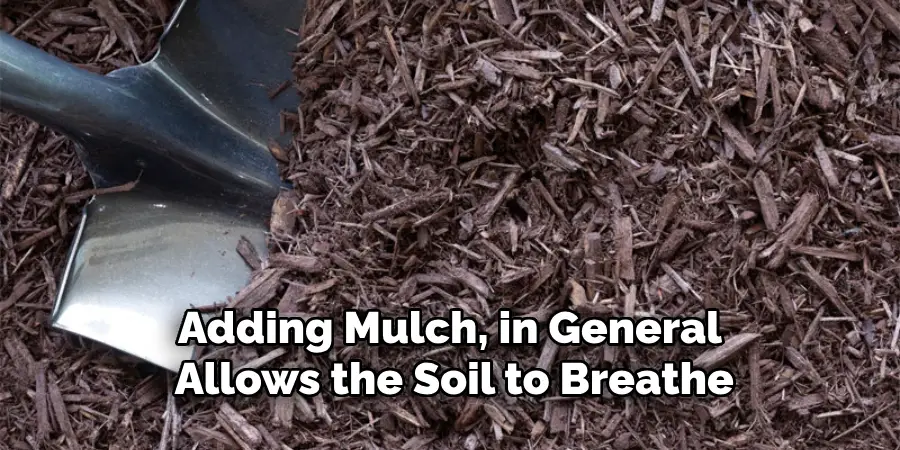
6. Ensure Proper Drainage
Drainage is a crucial factor in soil health. If excess water isn’t draining correctly, it can lead to root rot and other diseases that harm plant development and growth. One way to improve drainage is by adding compost or sand to the soil mix.
This addition can help to loosen dense soil, reduce compaction, and increase aeration. You can also consider creating raised garden beds or using containers with good drainage holes if your soil has poor drainage.
7. Regular Soil Testing
Finally, regular soil testing is essential to ensure your efforts pay off. Testing every year will indicate the levels of nutrients in your soil and the pH levels. It will also show whether the changes you’ve made have positively affected your soil quality. Regular testing can help you adjust your approach, ensuring your garden thrives.
That’s it! You’ve now learned seven tips on how to make soil from scratch. Remember to understand your soil type, compost regularly, add nutrients and organic materials, use mulch, ensure proper drainage, and do regular soil testing. With these tips in mind, you can create healthy and nutrient-rich soil for all your gardening needs.
5 Benefits of Making Soil from Scratch
1. Improved Soil Structure
Making your own soil from scratch is a great way to improve the structure of your soil. By creating your own blend of organic materials, you can ensure that the soil has the right balance of air, water, and nutrients. This will help to create a healthy environment for plants to thrive in and will also help to reduce compaction and erosion.
2. Better Nutrient Retention
Creating your own soil from scratch can also help to improve nutrient retention in the soil. By adding organic matter such as compost or manure, you can increase the amount of nutrients available for plants to absorb. This will help to ensure that your plants are getting all of the nutrients they need in order to stay healthy and productive.
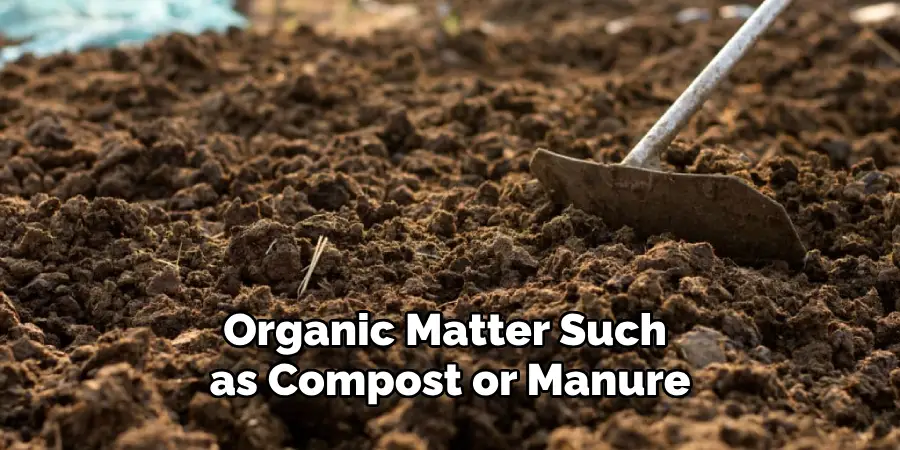
3. Increased Water Retention
Making your own soil from scratch can also increase water retention in the soil. By adding organic matter such as compost or peat moss, you can help to retain more moisture in the soil which will reduce the need for frequent watering and allow plants to stay hydrated during dry periods.
4. Improved Drainage
Creating your own soil from scratch can also improve drainage in the soil by increasing porosity and reducing compaction. This will help prevent waterlogging and root rot while also allowing for better air circulation around plant roots which is essential for overall plant health and growth.
5. Reduced Weeds
Making your own soil from scratch can also reduce weed growth by improving the quality of the soil and making it less hospitable for weeds. Adding organic matter such as compost or manure can help make it harder for weeds to establish themselves in the garden by improving nutrient levels, increasing water retention, and improving drainage which all work together to make it difficult for weeds to survive.
Some Common Mistakes People Make When Trying to Make Soil from Scratch
Creating nutrient-rich soil from scratch can be daunting, even for experienced gardeners. However, it can be done with some research and trial and error.
Unfortunately, many people make common mistakes that can hinder the success of their soil-building efforts. One of the most common mistakes people make is adding too much compost or manure. While these organic materials are beneficial, they can make the soil too rich when added in excess, causing plants to struggle or even die.
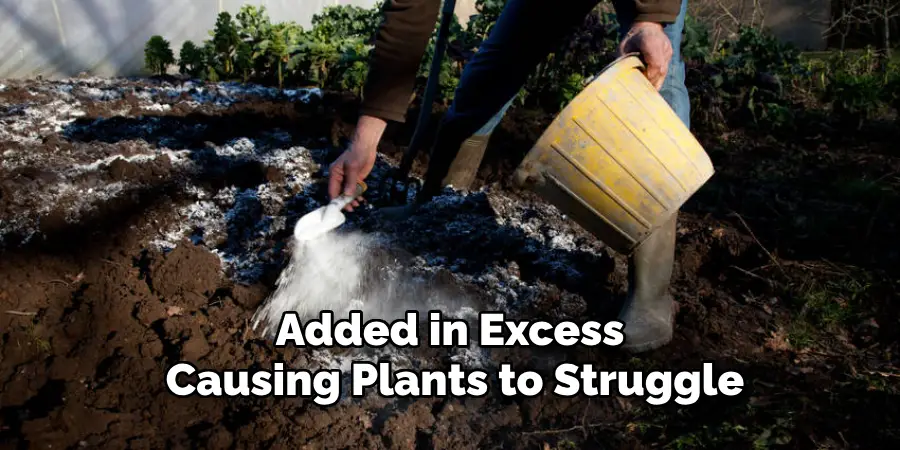
Another mistake people make is not properly balancing the pH levels of their soil. Plants cannot absorb nutrients from the soil if the pH is too high or too low. By avoiding these common mistakes, gardeners can create perfect soil for their plants to thrive in.
Conclusion
In conclusion, now you know how to make soil from scratch. Improving soil quality involves layering and adding nutrients, moisture retention, and organic matter to the soil. Sand or clay is no longer a hindrance to growing bountiful gardens thanks to tips like composting, adding organic fertilizers, mixing in peat moss, and incorporating mulch into your garden.
With a little effort, you can grow any plant you want and be rewarded with a lush and abundant harvest from your garden. Start small, and you’ll see that your garden’s soil quality will improve over time.
About
Outdoor Fixes is a distinguished figure in the world of Diy design, with a decade of expertise creating innovative and sustainable Diy solutions.
His professional focus lies in merging traditional craftsmanship with modern manufacturing techniques,
fostering designs that are both practical and environmentally conscious. As the author of diy,
outdoorfixes delves into the art and science of outdoorfixes-making, inspiring artisans and industry professionals alike.
Education RMIT University
(Melbourne, Australia) Associate Degree in Design (Outdoor Fixes) Focus on sustainable design, industry-driven projects,
and practical craftsmanship. Gained hands-on experience with traditional and digital manufacturing tools, such as CAD and CNC software.
Nottingham Trent University
(United Kingdom) Bachelor’s in outdoorfixes.com and Product Design (Honors) Specialized in product design with a focus on blending creativity with production
techniques. Participated in industry projects, working with companies like John Lewis and Vitsoe to gain real-world insights.
Publications and Impact
In diy, Outdoor Fixes his insights on indoor design processes, materials, and strategies for efficient production.
His writing bridges the gap between artisan knowledge and modern industry needs, making it a must-read for both budding designers and seasoned professionals.

